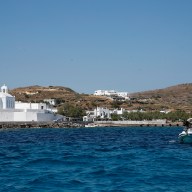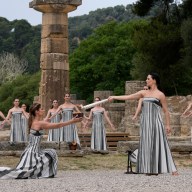BRUSSELS, Belgium – The European Union is about to pick its very first president, a post conjured up after years of tortuous political machination to give the bloc a unified voice on the world stage.
But what is emerging from the halls of power on the eve of the historic decision is confusion and cacophony.
There are still no official candidates, and yet more than half a dozen politicians are said to be in the running. Prospects range from the world-famous Tony Blair to a little-known figure named Herman Van Rompuy, the unassuming prime minister of Belgium.
Nevertheless, at a dinner Thursday the 27 EU leaders are to pick the president – as well as a foreign minister for Europe – in a ballot that looks more like something between a lottery and a dogfight.
Diplomats are bracing for an hours-long battle over these and other jobs for political pals, which many expect will last into the small hours of Friday.
The whole process appears to make a mockery of the EU’s lofty and long-stated aim of “streamlining” the European decision-making process by creating executive positions that will make Europe stand tall in the world.
Swedish Prime Minister Fredrik Reinfeldt, holder of the rotating EU presidency, suggested Wednesday it be an uphill slog to get agreement on the two top jobs.
“Do we get these new figures?” he asked at a news conference in Stockholm. “Well, I don’t know. It might take a few hours. It might take all night … That is what I am preparing for.”
To come this far, the EU made the Irish vote twice in a referendum, brushed aside hostile French and Dutch ballots for an earlier version of the plan, and strong-armed the Czech president into signing a European treaty so densely written that critics have compared it unfavourably to the phonebook.
For Europe, it’s a familiar conundrum: the continent longs for strong leadership but, in the end, decision-by-consensus is built into the very core of the European project.
Thus, in order to pick a president, leaders must strike the right balance between big countries and small, rich and poor, east and west, socialists and conservatives.
Enter Van Rompuy.
The conservative Belgian leader, whose impish demeanour seems to match his lightweight political credentials, has emerged as an unlikely front-runner and may reign victorious simply by virtue of being the least offensive candidate.
Blair, with star power in spades, had been an early favourite for the presidency – but it appears national leaders like the energetic French President Nicolas Sarkozy got cold feet when they realized they might get upstaged.
Furthermore, many Europeans chafe at the prospect of being led by a Briton who as prime minister kept Europe at an arm’s distance and his nation out of the common EU currency. And Blair’s staunch support for the Iraq war makes him anathema to millions on a continent that was largely opposed to the invasion.
Van Rompuy’s other rivals include Dutch Prime Minister Jan-Peter Balkenende, Luxembourg Premier Jean-Claude Juncker, Toomas Ilves, the Estonian president, and Vaira Vike-Freiberga, the former Latvian president, the only female candidate touted. None, it has been noted, are from France or Germany, the traditional motors of the EU.
The EU has a long history of horse-trading for plum jobs.
At a 1994 summit in Greece, Britain vetoed then-Belgian leader Jean-Luc Dehaene as European Commission president. After 12 hours, the job went to Luxembourg premier Jacques Santer – whose EU executive team quit in 1999 amid fraud and nepotism allegations.
On May 1, 1998, they picked the first European Central Bank chief at a Brussels lunch that became a 12-hour political slugfest. French president Jacques Chirac vetoed Germany’s choice of Wim Duisenberg, the Dutch central banker, but in the end, Duisenberg and France’s Jean-Claude Trichet ended up splitting the ECB chief’s first term.
And at a December 2003 summit, Italian Premier Silvio Berlusconi famously vetoed putting the EU food safety agency in Finland. “The Finns,” he bristled, “don’t even know what prosciutto is.”
The agency went to the Italian city of Parma, which is the most famous producer of the Italian ham.
Somewhat oddly, the EU reform treaty does not spell out what the EU president’s job really is. The original idea was that a European president would give the EU a bigger profile on the world stage, one commensurate with its economic heft.
That appears to have changed. The role of Europe’s face to the world may have subtly shifted to the EU’s foreign minister, who will get a say over the bloc’s annual C7 billion ($10.5 billion) foreign aid budget and a new 5,000-strong EU diplomatic corps. The EU president would head a cheaper operation, liaising between EU capitals and chairing the bloc’s five or six annual meetings.
For Reinfeldt, the job of brokering a deal has been an exhausting responsibility.
“I’ve now been talking for four working days and some nights with my colleagues. This is an EU of 27. Just to make a phone call – and I don’t know if you have tried this – but try to get in contact with 26 heads of state and government within 24 hours. Good luck!” Reinfeldt said Wednesday.












